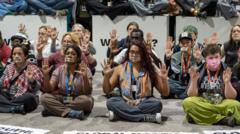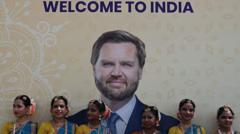The recent COP29 climate conference has left many questioning the effectiveness of the agreements reached, especially from the perspective of developing nations.
**COP29: A Fragile Consensus Amidst Growing Discontent**

**COP29: A Fragile Consensus Amidst Growing Discontent**
Reactions from developing countries highlight the inadequacy of commitments.
Despite a landmark pledge of $300 billion in climate finance for developing countries by 2035, frustrations erupted as many delegates characterized the sum as insufficient and largely symbolic. Although this figure appears substantial against the current $100 billion per year, concerns arose regarding the mix of grants and loans, and the last-minute nature of the negotiations. India's delegate, Chandni Raina, expressed discontent, declaring the agreement an "optical illusion" that overlooked the depth of the climate crisis.
Moreover, the negotiations reopened old rifts between rich and poor nations, with developing countries emphasizing that wealthier states failed to grasp the extent of their challenges. The upcoming arrival of a climate skeptic president in the United States has led many to believe that the deal struck may be as good as it gets.
Critiques of the conference also centered on the organizing host, Azerbaijan, whose heavy investment in oil and gas contradicted the goals of COP. The nation's president's dismissal of critical media narratives did little to alleviate tensions. As negotiations faced calls for reform amid frustrations from negotiators, many are wondering whether COP, in its current form, can effectively tackle the climate emergency.
Looking ahead, China's role as a potential climate leader has garnered attention amidst fears of U.S. withdrawal from global agreements under a new administration. The nation, still classified as a developing country, has agreed to a voluntary financial contribution structure aimed at assisting vulnerable nations, signaling a shift towards increased transparency in their climate finance dealings.
However, the shadow of Donald Trump loomed over the conference, with negotiators keen to structure commitments that could withstand potential setbacks from a return to his administration. The aggressive activism from NGOs at COP29 underscored the urgent call for stronger action, as campaigners expressed dissatisfaction with the concessions made.
As the global community reflects on the outcomes of COP29, the question remains whether the fragile agreements can withstand the impending challenges posed by geopolitical shifts and the unwavering realities of climate change.
Moreover, the negotiations reopened old rifts between rich and poor nations, with developing countries emphasizing that wealthier states failed to grasp the extent of their challenges. The upcoming arrival of a climate skeptic president in the United States has led many to believe that the deal struck may be as good as it gets.
Critiques of the conference also centered on the organizing host, Azerbaijan, whose heavy investment in oil and gas contradicted the goals of COP. The nation's president's dismissal of critical media narratives did little to alleviate tensions. As negotiations faced calls for reform amid frustrations from negotiators, many are wondering whether COP, in its current form, can effectively tackle the climate emergency.
Looking ahead, China's role as a potential climate leader has garnered attention amidst fears of U.S. withdrawal from global agreements under a new administration. The nation, still classified as a developing country, has agreed to a voluntary financial contribution structure aimed at assisting vulnerable nations, signaling a shift towards increased transparency in their climate finance dealings.
However, the shadow of Donald Trump loomed over the conference, with negotiators keen to structure commitments that could withstand potential setbacks from a return to his administration. The aggressive activism from NGOs at COP29 underscored the urgent call for stronger action, as campaigners expressed dissatisfaction with the concessions made.
As the global community reflects on the outcomes of COP29, the question remains whether the fragile agreements can withstand the impending challenges posed by geopolitical shifts and the unwavering realities of climate change.




















